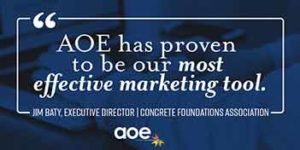 There are many stereotypes associated with sales professionals. There’s the slick-dealing used-car salesman type who makes people feel suspicious. There’s the natural-born salesman who walks into the room and is instantly everyone’s new best friend, with talents in every area and the best jokes. Then, there’s the talesman, the unknowingly annoying salesman. Ask this type for the time and you’ll get how to build a watch. Then there are the salespeople who don’t realize their potential. These are the ones who can grow into great salespeople. Here is some practical advice when approaching sales that will help you sell more concrete.
There are many stereotypes associated with sales professionals. There’s the slick-dealing used-car salesman type who makes people feel suspicious. There’s the natural-born salesman who walks into the room and is instantly everyone’s new best friend, with talents in every area and the best jokes. Then, there’s the talesman, the unknowingly annoying salesman. Ask this type for the time and you’ll get how to build a watch. Then there are the salespeople who don’t realize their potential. These are the ones who can grow into great salespeople. Here is some practical advice when approaching sales that will help you sell more concrete.
In sales, and life for that matter, acknowledging your weaknesses is the only way you’ll actually improve. This is called the status quo, but you really need “status grow.”
Recognizing personality traits or habits that hurt you in a sales call could dramatically change your career trajectory. How can you find out if what you’re doing is wrong or right? Someone has to tell you, and you have to humbly consider the validity of their words. These may come from a colleague, boss, blog, book, seminar speaker or a tiny voice within. Once those words resonate enough to strike a chord, the freedom of new possibilities can be uplifting. You can begin laying the concrete foundation to greater sales and career success. It is invigorating!
I have experienced and grown in career-changing ways by recognizing my weaknesses. A couple of years ago I was an average to below-average salesman. I masked it by working harder and longer than anyone else. I would go through the sales cycle of ups and downs, and burned out quickly. My biggest problem was not ever thinking about the good, bad and ugly of my ability to sell. I never reflected, analyzed or critiqued myself, and my mediocre numbers showed it.
On a long road trip, I downloaded an audio book by a famous sales guru who completely changed my worldview on sales. In 2014 my sales increased by 98 percent from 2013. I hit my sales target by August and kept rolling. My lead-to-sales ratio was nearly double the next-closest rep. More importantly, a sales rep I had trained and mentored closely nearly doubled sales in his territory. Acknowledging one’s weakness can tell you whether you are a salesman or a talesman.
Don’t answer questions customers didn’t ask.
A talesman loves to hear his own voice. When a customer begins asking, “How long does . . . ,” the talesman quickly answers. “Oh, it’s concrete so it’s going to last forever. I just read the other day about some scientist finding concrete remnants from thousands of years ago. Blah, blah, blah.” Five minutes later the talesman (we’ll call him Tally) stops and the bewildered customer says, “I was going to ask, ‘How long does it take to install?’”
The reason: Answering a question not asked by clients means you’re not discussing what they find valuable. People pay for valuable, not worthless, things.
Ask questions, lots of questions. Then listen.
A salesman listens closely to every possible clue to discern a client’s true needs. A salesman asks questions, and answers the client’s questions with more questions. “How long does it take to install?” asks the client.
“Great question. Is there a specific event or deadline you need to meet?” (It doesn’t have to be a good question; sometimes bad ones get better results.)
“No, I just had this fencing contractor take two months to finish a simple job and it was an awful experience.”
The reason: Salesman Sal learned more about potential objections and found the real reason for the client’s question. You are there to provide a solution, and cannot do that until you know the actual problem.
Don’t give a dissertation.
Tally uses more words than his new stamp overlay has fibers. Answer questions in simple terms. When a client asks how a product sticks, Tally lets his fancy knowledge of chemistry and acronyms dominate the conversation. Too bad the client didn’t ask about the product’s chemical characteristics that would ensure a bond strength greater than 400 psi, because Tally would have knocked his answer out of the park.
The reason: Not until I started working in decorative concrete did I care about installation process or proprietary formulas. I just wanted it to look good and last many years. While some incredible people out there want extreme technical knowledge, most do not. Understand and learn quickly where your client falls on this spectrum. Every client is different, and most of them are not engineers. Listen to the question and respond appropriately.
Speak less than your client.
Sal lets his customer do most of the talking, and if conversation stops he asks another question. When asked how the product sticks, Sal responds, “That’s a good question. Is bonding a concern or are you concerned how we install the product?” Whatever the answer, Sal has learned valuable information and can appropriately answer.
The reason: You have less chance of talking yourself out of the sale if you’re not doing most of the talking. Letting clients talk reveals subtle clues about their real problem. Hearing yourself talk gains nothing. Hearing your clients talk may reveal how to sell them a solution.
Don’t pretend or you’ll offend.
Tally likes to build strong relationships with clients, but his good intentions hurt when he pretends to be knowledgeable in subjects of which he knows little. He notices his potential client’s affinity for an out-of-town football team so he comments about how great the quarterback is at scrambling. Unbeknownst to him, the quarterback, and his reputed “cement feet,” retired a year ago. Distrust begins to grow and the client now wonders what else Tally might have misinformation about.
The reason: Misinformation on any subject is potentially a deal breaker. Stick to being a decorative concrete expert because those experts are few and far between. Always assume your client knows more about everything else. If you don’t have an answer to a question, tell the truth and find it for them.
Be honest about your knowledge.
Sal is known for being a straight shooter who never misleads clients. His honesty has led to exponentially more word-of-mouth leads than any of his competitors. Sal even recommended a competitor when his team couldn’t complete a job in time. Sal got the job without meeting the client’s deadline because of his honesty and the client’s comfort level with him.
The reason: With the fear of bad contracting ethics a reality, it’s imperative to build trust. Lying to build trust is wrong on every level and will doom your business. Honesty is what everyone wants. Never compromise your client’s trust with seemingly unimportant lies.
So, are you a salesman or a talesman?
Here is some parting advice: Don’t stop trying to better yourself in every aspect of your sales process. You can grow your territory, business, income and personal successes. Never blame any of your sales hurdles on anyone but yourself.
Every obstacle is an opportunity, and every opportunity is a chance to gain capital. Capital is not always monetary, but gain is always positive. You can always improve, and you can never sell too much.
Leave the tall tales for people writing about harpooning large white whales! It takes guts to discover your bad habits, and it takes heart to overcome them. There is never a better opportunity to start than right now! Become a salesman, and wear that badge with pride.















